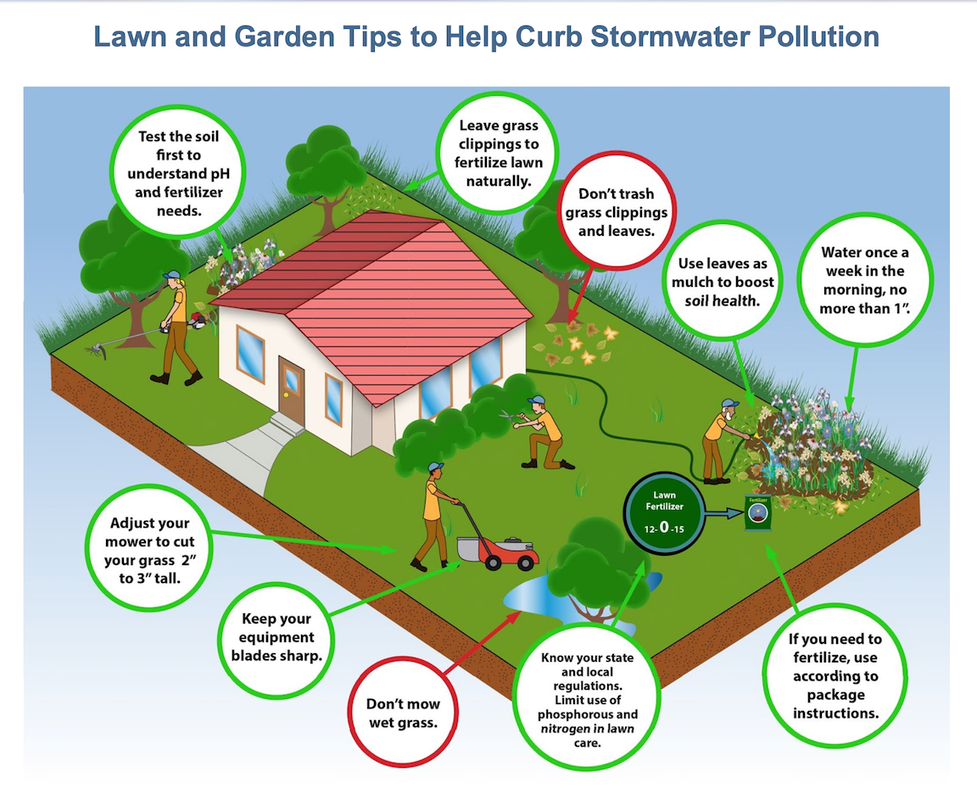LAWN CARE
Massachusetts Law
Phosphorus runoff poses a threat to water quality. Therefore, under Massachusetts law, phosphorus-containing fertilizers should not be applied to lawns. See detailed fact sheet, and an overview and exceptions.
Phosphorus runoff poses a threat to water quality. Therefore, under Massachusetts law, phosphorus-containing fertilizers should not be applied to lawns. See detailed fact sheet, and an overview and exceptions.
| Spring_2023_fertilizer_phosphorus_letter.pdf |
Best Practices
Lawn Alternatives:
• Plant pollinator gardens and swale gardens to replace lawns.
• Plant a smaller lawn. Fill in with other kinds of cover, flowering plants, leafy plants, trees, rocks.
• Let clover and other legumes grow.
• Plant hardy fescues, not Kentucky bluegrass.
• Learn more about watershed-friendly yards from NepRWA.
Lawns with less, or without fertilizer:
• Don't use fertilizer on lakefront lawns.
• Improve your soil with compost.
• Have your soil tested before fertilization, and only apply the deficient nutrients. Soil testing is
available from the UMass Amherst Soil and Plant Nutrient Testing Lab for $20.
• Apply only slow-release fertilizer, once (or twice) a year, only in the spring (and/or fall).
• Test your soil and correct pH if needed. Read more.
Mowing
• Set your mower to the mulch setting and leave the clippings on the lawn.
• Mow grass to no less than 3 inches, and mow more often; this also saves on watering.
Watering
• Turn off that automatic sprinkler!
• If you must water, water infrequently (once a week or less) but deeply (one inch). This will encourage
the grass to grow deep roots, increasing its chances for survival in a drought.
Use common sense - do not water after a heavy rainfall has given your lawn a good soaking.
• Let your lawn turn brown during a dry time - it's dormant, not dead, and should come back.
Learn more about the Town of Sharon's water system.
• Plant pollinator gardens and swale gardens to replace lawns.
• Plant a smaller lawn. Fill in with other kinds of cover, flowering plants, leafy plants, trees, rocks.
• Let clover and other legumes grow.
• Plant hardy fescues, not Kentucky bluegrass.
• Learn more about watershed-friendly yards from NepRWA.
Lawns with less, or without fertilizer:
• Don't use fertilizer on lakefront lawns.
• Improve your soil with compost.
• Have your soil tested before fertilization, and only apply the deficient nutrients. Soil testing is
available from the UMass Amherst Soil and Plant Nutrient Testing Lab for $20.
• Apply only slow-release fertilizer, once (or twice) a year, only in the spring (and/or fall).
• Test your soil and correct pH if needed. Read more.
Mowing
• Set your mower to the mulch setting and leave the clippings on the lawn.
• Mow grass to no less than 3 inches, and mow more often; this also saves on watering.
Watering
• Turn off that automatic sprinkler!
• If you must water, water infrequently (once a week or less) but deeply (one inch). This will encourage
the grass to grow deep roots, increasing its chances for survival in a drought.
Use common sense - do not water after a heavy rainfall has given your lawn a good soaking.
• Let your lawn turn brown during a dry time - it's dormant, not dead, and should come back.
Learn more about the Town of Sharon's water system.
